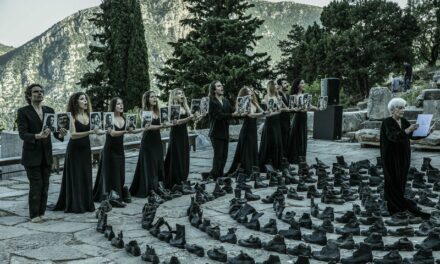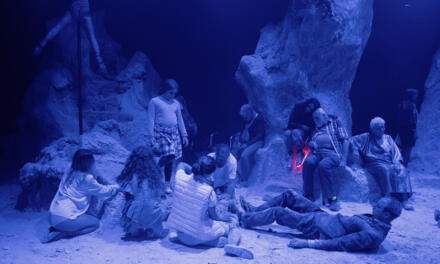It is as if Mozart were able to capture what death sounds like, in those moments when people run around trying to assert themselves in the face of a body that has just ceased to breathe. Personally, it takes just a few notes of his Requiem for me to deviate my attention from whatever occupies me and place it entirely at the mercy of this devastating tune. The music hits a region of my being where humor meets pain and where normality meets irrationality. The paradoxes and dead-ends of life itself start to make sense, even if I cannot ascertain words to speak about them. This same region was bombarded during the first few minutes of And So You See…Our Honourable Blue Sky And Ever Enduring Sun…Can Only Be Consumed Slice By Slice…
When And So You See… starts, the spectator is confronted with a mysterious bulk, a motionless body, placed downstage center but facing upstage, where, in turn, a camera captures, in extreme close up, what quickly reveals itself as the breathing rhythm of that bulk–a man wrapped up in white cloth. The image is impactful in itself, but it is the counterpoint of Mozart’s Requiem sounding in the room that makes it one of the most powerful theatrical moments I have experienced in recent times.
That motionless–yet breathing–body is performer Albert Ibokwe Khoza. One does not take long to realize just how unique a performer he is; a gem in contemporary theatre globally, I would venture to say. A commanding presence, and a mesmerizing voice, and a body that unsettles any gaze: provocatively feminine, dangerously profound, and genuinely in control. For the first fifteen minutes of the show–by the far the most glorious–Ibokwe Khoza unwraps himself, violent and guttural in an extended moment of noisy irrationality that is weirdly pleasurable. Fifteen minutes in which he confronts us with the grey-est region of our psyche. Like Mozart’s Requiem, that first section of the show speaks to a region of existence where things can’t entirely be defined, and precisely because of that I will remember this piece with warmth in my heart.

Photo: Jérôme Séron
Yet at the same time, it is naïve to ignore the extent to which Mozart’s Requiem, perhaps unwillingly, may easily fall prey to its own stereotype. It is often the go-to soundtrack, whenever the occasion demands “intensity.” Yet, for the very same reason, Mozart’s Requiem has the possibility of performing a commentary upon the spaces it fills, depending on the context in which it is played. To the same extent that it is used as one of the most cliché of clichés in film and stage music, it may also be employed to frame a critique of itself and of the cultural specificity from which it arises.
Similarly, past the fifteen-minute mark, And So You See… falls back on a worn-out stereotype of Africa-ness in order to build up its point. A collage of feel-good/feel-bad images and politics that border on what we might call a kind of “UN kitsch,” the hour-long show progresses by betraying the devastating irrationality of its first moments. In between eruptions of Mozart’s Requiem–which has, from the beginning, guided things forward–Ibokwe Khoza slowly commences to verbalize what needn’t be, and the binaries of politics of gender and race become, sadly, too self-evident. Perhaps in South Africa, the explicitness of such politics hits the point it aims to unsettle. A perfectly staged contradiction, between a song of death and the breath of life, that quickly announces the duality and binaries of death/life; black/white; Africa/Europe and the many other names, physical and conceptual, of an apartheid. Yet, in the context of an international festival, the show feels all too much like it abuses its own politics. I feel we enter dangerous zones when, as performers, we trade with the misfortune of our people back home for the sake of international political marketability.

Photo: Jérôme Séron
For example, while trying to figure out why an animated picture of Vladimir Putin has stopped dancing with him, Ibokwe Khoza, the Nubian queen, asks his Russian dance partner: “Is it because I am a man…or wait…is it because I am a black man?” That rationalized and thinned-down duality and binary-ism remains as the most evident thread for most of the show. The pinnacle of this happens when Ibokwe Khoza, still on point against Putin, claims that one should only dance with one’s own weapons (as opposed to using them), in what seems to be a troubling allusion to the idea of a mythic Africa where the darkest crevices of humankind would simply fail to crack open had the continent not been colonised. True, Ibokwe Khoza also mimics the kind of African dictator that, as much as European oligarchs, has Africa sunk in despair. But this reference, also stereotypical, feels all too convenient and transient. In this regard, the piece does not do justice to the potency of some of director Robyn Orlin’s stage poetry (a magnificent game of lights, for example) and Ibokwe Khoza’s own irrefutable power.
However, for the careful observer, the show about binaries and geopolitics is but white noise. While that part of the piece is dangerously close to being dreadful, whatever binary is alluded to stops mattering because the show has already said what it had to say long before the mimics of African-ness and the diluted political commonplace take over. Deeper, in the underbelly of Ibokwe Khoza’s own body, as it dances and references every cultural narrative that finds in its black male body an intersection, the show evokes the irrational in a masterful way right from the start.

Photo: Jérôme Séron
The brief to the show explains that the piece is [an] “enchantment of pure presence, he portrays the excesses of the seven deadly sins in a “requiem to humanity” on one level” (SIFA 2017). I don’t think this comes through. At least, I did not relate any moment of the score that Ibokwe Khoza delivered to any of the seven sins. Instead, the Requiem frames the non-narrative of a gesture performed towards the irrational. That gesture is self-reflective, and that twists and turns on its own axis to crack open the thick borders of its concept in order to remind you that the experience you are having cannot be separated from the body you are watching.
What is the irrational? And can this question be answered without contextual tendencies? Is And So You See… a performance of the irrational because a gay black man gets naked without any apparent purpose? Or is it because the final image of the show is of a child soldier? Or is it because it is about Africa, point blank? Or is it because for as long as its fifteen first minutes, we see a body enjoying its own capacity to detract from the rational world? The leitmotif of Mozart’s Requiem frames all these moments in relation to death, and at the same time, to the pitiful and the sacrosanct. But it also makes the piece resonate with those corners of our mind that host what can’t be rationalized without betraying its meaning. And while the staging performs a commentary on the imposition of death in Africa (and tangentially on gay activists in Russia–or have we forgotten the gay massacre in Chechnya?), at the same time it invites the attentive spectator to think twice about one’s own compulsions and repulsions, the extent to which these have already been conditioned before we experience them, and on the same account the possibility to confront them through performance.

Photo: Jérôme Séron
And So You See… is, therefore, a show of two complexities, at least. Firstly, the concert of geopolitical references it assembles hints at the necessity to denounce the darkest wishes and practices of the human condition. That level is probably the most evident. But there is a subjacent complexity that, more than expressing, allows the human condition itself, unhampered with cheap bio-political allusions, to body forth. That aspect of the show is hidden and resists interpretation.
Not an easy show to speak about, and probably one that will, like Mozart’s Requiem, fall prey to its own stereotype in time to come. No review or preview can put into words what happens in its beginning. But there are all too many words to qualify the marketed politics of the rest of the show.
And So You See…Our Honourable Blue Sky And Ever Enduring Sun…Can Only Be Consumed Slice By Slice… (first staged at Montpellier Danse Festival 2016) was choreographed by Robyn Orlin and performed by Albert Ibokwe Khoza and made its Asia-Pacific premiere at Singapore International Festival of Arts 2017 from 6 to 9 September at SOTA Studio Theatre.
This article originally appeared in Arts Equator on September 14, 2017, and has been reposted with permission.
This post was written by the author in their personal capacity.The opinions expressed in this article are the author’s own and do not reflect the view of The Theatre Times, their staff or collaborators.
This post was written by Felipe Cervera.
The views expressed here belong to the author and do not necessarily reflect our views and opinions.


















